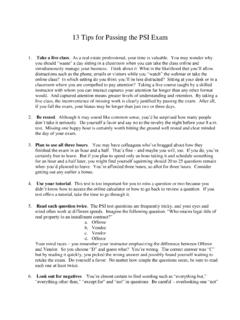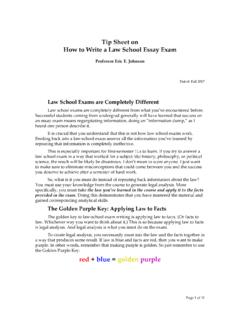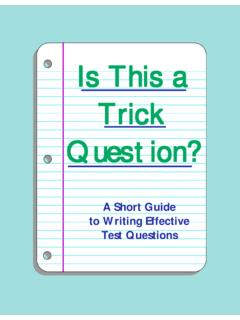Transcription of A Practical Guide to Conducting VA Compensation and ...
1 A Practical Guide to Conducting VA Compensationand Pension Exams for PTSD and Other Mental DisordersMark D. Worthen&Robert G. MoeringReceived: 24 November 2011 /Accepted: 27 November 2011 /Published online: 16 December 2011#Springer Science+Business Media, LLC. 2011 AbstractDespite being one of the most common forensicmental health evaluations, no article has ever appeared in apeer-reviewed journal describing how to conduct USDepartment of Veterans Affairs (VA) mental health compen-sation and pension examinations. This article rectifies thatpaucity of information. We outline the legal framework, eth-ical considerations, and administrative challenges inherent inthese evaluations.
2 We provide separate guidelines for privatepractice clinicians and VA staff or contractors. We pay specialattention to the multiple sources of collateral informationavailable for these exams and how to access relevant article alerts examiners to the possibility that they mightface resistance from VA officials if they screen for and assesssymptom exaggeration or feigning and that they could en-counter VA-imposed restrictions on time allotted for suggestions are made for different types of exams:Initial Post-traumatic Stress Disorder (PTSD), PTSD Review,Initial Mental Disorder, and Mental Disorder Affairs (VA).
3 Compensationand pension (C&P) BenefitsQuestionnaire (DBQ)In the US Department of Veterans Affairs (VA) 2010 FiscalYear, 60,535 veterans began to receive VA disability bene-fits for mental disorders (Veterans Benefit Administration,2010). The majority of those veterans received a compen-sation and pension examination (C&P exam) at a VA facilityor a contract provider s in 2011, private providers (primarily psychol-ogists and psychiatrists although other mental health pro-fessionals are eligible1) will be able to conduct some C&Pmental disorder exams with the advent of the VA snewDisability Benefits Questionnaire (DBQ) date, there are no articles published in peer-reviewedjournals that describe how to conduct VA mental health-related Compensation and pension exams.
4 Our intention is torectify the lack of peer-reviewed information by outlining arecommended procedure for Conducting four different typesof C&P mental disorder exams. The article also addresseslegal, ethical, and administrative concerns that arise withthese often complex forensic Mental Disorders DBQ form states: In order to conduct aninitialexamination for mental disorders, the examiner must meet oneof the following criteria: a board-certified or board-eligible psychia-trist; a licensed doctorate-level psychologist; a doctorate-level mentalhealth provider under the close supervision of a board-certified orboard-eligible psychiatrist or licensed doctorate-level psychologist.
5 Apsychiatry resident under close supervision of a board-certified orboard-eligible psychiatrist or licensed doctorate-level psychologist; ora clinical or counseling psychologist completing a one-year internshipor residency (for purposes of a doctorate-level degree) under closesupervision of a board-certified or board-eligible psychiatrist or li-censed doctorate-level psychologist. In order to conduct areviewexamination for mental disorders, the examiner must meet one of thecriteria from above, OR be a licensed clinical social worker (LCSW), anurse practitioner, a clinical nurse specialist, or a physician assistant,under close supervision of a board-certified or board-eligible psychia-trist or licensed doctorate-level psychologist.
6 (emphasis added). See: article and the recommendations or opinions stated hereinshould in no way be construed to reflect the opinions or beliefs of theUS Department of Veterans Affairs or the US government. Theopinions expressed in this article are the authors D. Worthen (*) Compensation & Pension Program, Charles George VA MedicalCenter, Department of Veterans Affairs,1100 Tunnel Road,Asheville, NC 28805-2576, USAe-mail: G. MoeringCompensation & Pension Office, James A. Haley Veteran sHospital, Department of Veterans Affairs,Tampa, FL, USAP sychol. Inj. and Law (2011) 4:187 216 DOI four types of exams covered in this article are:&Initial Post-traumatic Stress Disorder (PTSD)&PTSD Review&Initial Mental Disorder&Mental Disorder ReviewLegal FrameworkLike all forensic mental health evaluations, VA compensa-tion and pension exams exist within a legal framework, ,a collection of statutes, regulations, and case law that deter-mine the referral questions asked of examiners; outline theprocedures veterans must follow to establish a disabilityclaim; describe how evidence is weighed; govern whomay conduct these exams; and otherwise define the C&Pexam process.
7 Understanding the legal landscape is impor-tant for examiners because referral questions often directlyor indirectly reference statutes or regulations, case law candictate the content of an exam report and the rules ofevidence used to evaluate the adequacy of an examiner sdocumentation and rationale (Nieves-Rodriguez v. Peake,2008), and one s ethical code might require Legal HistoryAlthough providing monetary benefits for US veterans datesback to the Revolutionary War (Ridgway,2011), contempo-rary veterans Compensation law has its roots in 1917 amend-ments to the War Risk Insurance Act of 1914 (EconomicSystems Inc.)
8 ,2004), which provided Compensation toWorld War I veterans for average impairment in earningscapacity. That phrase, average impairment in earningscapacity is important because the 1917 laws represented ashift from gratuity payments (awarding benefits as a thankyou to veterans for their service) to an indemnity modelthat compensates veterans for functional impairments thatadversely affect their ability to work (Economic SystemsInc.,2004).Mental health professionals interested in conductingC&P exams need to keep that distinction in mind becausea crucial issue for them to address in their exam report is theextent of the veteran s occupational impairment.
9 In thisregard, C&P exams are similar to Social Security disabilityevaluations in that occupational impairment is the focus(Foote,2008). Also, some examiners seem to mistake VAcompensation as anentitlementprogram, , one thatawards benefits for a veteran s service in a combat zonewhen, in fact, it is anindemnityprogram in which the VAprovides benefits to veterans who have suffered occupation-al impairment as a result of their psychological , the statutory authority for regulations govern-ing the VA s Compensation program comes from Title 38 ofUnited States Code. Regulations are primarily found in 38 Code of Federal Regulations ( ), Part 3 and Part 4.
10 Acomprehensive review of veterans law (statutes, regulations,and case law) is beyond the scope of this article (but seeRidgway,2011in this issue). Instead, we will focus onimportant differences between the legal parameters govern-ing the adjudication of veterans disability claims and thelegal contours of more traditional forensic mental Legal ParametersThe most important difference to understand is that proceed-ings regarding VA Compensation and pension claims areintentionally informal and nonadversarial ( Proceedings be-fore VA areex partein ; Procedural Due Processand Appellate Rights, 38 , 2010), and they are uniquely pro-claimant (Hodge v.)









